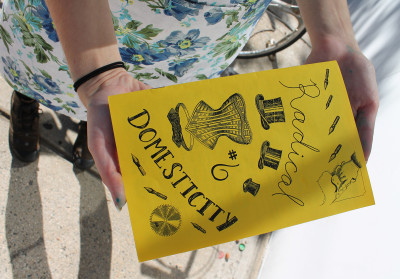
It is often difficult to tell if activism-oriented events have any substantial impact on those who attend them, but it was clear that the Boston Zine Fest, held Saturday and Sunday, not only exposed attendees to new ideas, but also inspired them to act.
The festival’s first day at Make Shift Boston included a panel discussion on how zines serve as a form of radical resistance. The panelists first talked about how they were introduced to zines, during which Stephanie Crumley, active zinester and director of The Humane League, recounted her discovery of zines at last year’s BZF, when she was particularly inspired by fellow zinester Ponyboy Violet’s reading of their zine “ANAlog: Dispatches on D.I.Y. Anorexia Recovery.”
“Ponyboy did a zine reading that really resonated with me,” Crumley said. “I went home, cried for a while and created my first zine on disordered eating.”
For those unfamiliar with zines, Somerville’s Papercut Zine Library defines them as “independently produced, self-published, underground publication[s], typically photocopied.” Papercut goes on to say that zines aren’t generally made out of a desire for commercial success, but rather “to share stories, knowledge, thoughts, opinions and experiences.”
Like Crumley, panelist Jamezie explained how the thoughts and experiences shared through zines can be life-changing. Jamezie said that while growing up, they felt alone in their struggles with gender identity until coming across Julia Eff’s zine “Every Thug is a Lady,” which deals with gender dysphoria and the idea and practice of living without gender. This experience bolstered Jamezie’s belief in the importance of zines as a resource for people who don’t identify with dominant ideologies.
“Reading Julia’s zine really helped me process things that I did growing up, and it helped me get to that point where I was able to talk about it,” Jamezie said. “So I thought putting it into a zine and hopefully connecting with other people who had similar experiences would help that cycle continue.”
Now, Jamezie creates the zine Gendercraft, which is about mental health issues and people coming to understand themselves as trans. Jamezie works to ensure that other trans people don’t feel isolated in their non-normative experiences with gender.
“Even if it’s not like, ‘Oh, this [zine] is going to change the worldview of everyone in the city,’” Jamezie said, “even if you can change one person’s life in any measurable amount, that’s an amazing thing to accomplish, and that’s what I hope to do with my zines.”
Saturday’s portion of the fest also included a craft workshop and zine readings. The organizers also made a point to implement changes after noting what didn’t work last year.
BZF organizer and Boston University graduate Sylvia Kim listed finding venues more accessible to disabled attendees and adding a nursing room and childcare as some of the improvements the BZF team made for this year. Peter Loftus, another of the event’s organizers, added that the extra effort put into fundraising allowed organizers to provide travel assistance to two participating zinesters.
However, BZF organizers recognize that there is still room for improvement.
“One of our goals for next year is reaching out to people who have never even heard of zine culture,” Kim said. “The zine community can feel really insular.”
Both years, BZF organizers have made their policies to create a safer space, free from oppressive or discriminatory behavior, very clear. But an incident Saturday in which a man yelled an upsetting and sexist comment during zinester ess elle’s reading revealed the difficulties of managing the situation when someone violates these policies.
“We hadn’t thought about conflict resolution training,” Loftus said. “It was kind of a trial by fire. There’s always more work to be done in creating safer spaces.”
Sunday, the feeling was nothing but excited and supportive. Almost 90 different zinesters set up shop at Simmons College to sell zines of all kinds. But whatever small profit, if any, people might have made from selling zines was not the point of the event. Many traded zines, priced them on a sliding scale or even told a potential buyer to “just take it.”
Brooklyn-based zinester Anna Flinchbaugh, pen name annamaize, was one of the zinesters who offered her work for free. In her zine “Important Things to Know,” Flinchbaugh cleverly juxtaposes social commentary with practical, lighthearted material like recipes and the ukulele chords for an Amanda Palmer song.
“I wanted to express that it’s just as much a fact that you can’t slut shame as it is that there are 16 tablespoons in a cup,” Flinchbaugh said.
Unsurprisingly, Flinchbaugh championed the accessibility of zine making, but also touched upon zines’ ability to unite people.
“There are such low barriers to entry,” she said, “but you get to join such a rich community.”




